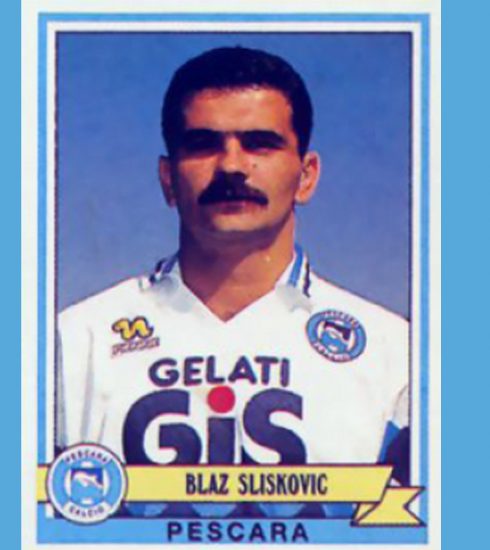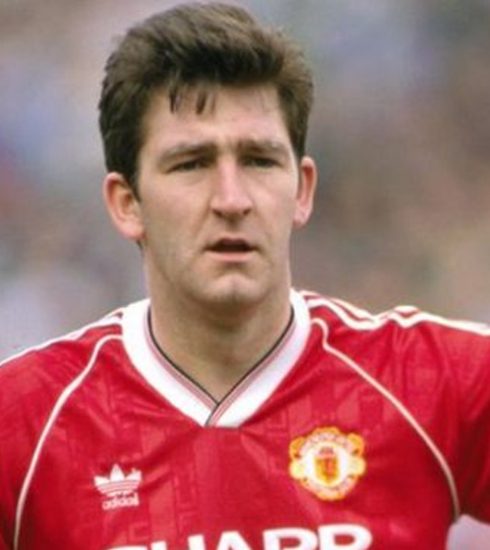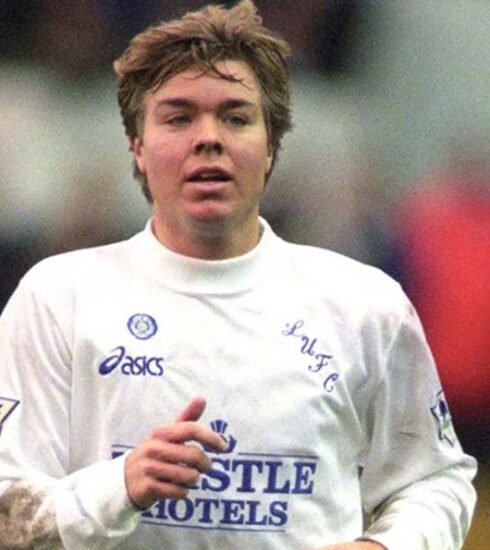PIERINO PRATI: Just a bloody misunderstanding



When Pierino Prati turned up for the first time in July 1967 at the Milan training camp for a friendly in Belgium, the impact with Nereo Rocco, the great ‘Paron’ coach of the Rossoneri, was memorable.
An accompanying manager introduces Prati to Rocco.
“Mr Rocco, I have brought you Pierino Prati.”
Rocco “teams” the young striker from head to toe.
Pierino is 20 years old, has long hair with a rebellious topknot, a pink shirt and strictly ‘bell-bottom’ trousers as suggested by the fashion dictates of the time.
After a good couple of minutes observing him, Rocco exclaims “Look, I’m waiting for Pierino Prati the footballer, not the singer! Send this one back where he came from!”.
What was to follow was in fact a special relationship between a talented footballer who did not disdain work and above all had a great desire to improve and arrive.
Pierino Prati returned to Milan that summer after his loan at Savona the previous year.
‘Making his bones’ as they used to say back then.
This time in Serie B, after his experience at Salerno in C two years earlier.
15 goals in 29 games is an excellent haul, especially considering that Savona would be relegated to Serie C that year.
The Milan of the great Nereo Rocco realised he was needed.
They attached him to the first team in that summer of 1967.
It took Pierino a few weeks to convince the ‘Paron’ that he deserved a place in the first team.
In the 7th game of the season, in the away match against Cagliari, Prati was on the pitch from the first minute.
He scored Milan’s second goal, the one that was useful to snatch a draw against Riva and his team-mates.
From that day on, he would not stop.
At the end of the championship, he scored a total of 15 goals, which earned him the title of best scorer in Serie A, to which he added three goals in the Coppa Italia and four in the Cup Winners’ Cup, which Milan won in the final against Hamburg, thus crowning a wonderful season.
Prati’s impact will be so devastating that Ferruccio Valcareggi, the head coach of our national team, will include him in the squad of the Azzurri who will triumph in the European Championship that summer.
In this competition, however, will begin one of the most absurd misunderstandings in the recent history of our football. Almost on the level of the one that will be created between Rivera and Mazzola, players with such different characteristics as to be not only perfectly compatible but even complementary.
Pierino Prati from that summer of 1968 will always be seen as THE ALTERNATIVE to Gigi Riva, an extraordinary striker and probably unique in the history of our football … but who COULD (and perhaps SHOULD) play WITH Pierino Prati, thus forming an absolutely devastating attacking pair.
Prati and Riva were, as characteristics, complementary and certainly not identical.
Prati was a natural right winger who could also kick with his left.
Riva was a pure left-hander. He only needed his right leg for running and balancing.
Prati liked to start more from a distance and move around the entire attacking front, while Riva acted essentially in the last 20 metres.
The fact is that Pierino played the first match of the finals against Yugoslavia but in the replay he had to make way for Gigi Riva who scored one of the two goals that gave victory to Ferruccio Valcareggi’s Azzurri.
The following season was the one of definitive consecration for Prati and for Milan.
In the championship the Rossoneri finished second, tied with Cagliari, but in the European Cup Milan reached the final.
The game was played at the Santiago Bernabeu in Madrid, and in front of them were the surprising ‘Lancers’ of Ajax Amsterdam, a team full of young talents among whom stood out 21-year-old Johann Cruyff, a fast and unpredictable player.
Milan, however, were in an evening of grace.
And if it is true that Rivera enchanted the world with his superlative technique and his vision of the game, no one remained indifferent to the sensational performance of Pierino Prati, who that evening would enter the history of the most prestigious European club competition by scoring a hat-trick in the final.
A few months later the Rossoneri would close out a sensational two-year period with victory in the Intercontinental Cup, first by beating the Argentinians of Estudiantes in San Siro and then stoically withstanding the ‘shame’ of the return match at the Bombonera in Buenos Aires, one of the most violent pages in the history of the sport.
Prati began to suffer some physical injuries and ended the season with 17 goals.
Not enough, however, to win him a place on the plane that would take the Italian national team to Mexico. Valcareggi will convoke only 3 forwards. Together with Riva there are only the Juventus player Pietro Anastasi and Sergio Gori, Riva’s ward mate in the newly Italian champion Cagliari.
Shortly before the departure for Mexico Pietro Anastasi was forced to forfeit.
At that point Valcareggi realised the oversight and not only called up a striker in place of Anastasi but also decided to send home midfielder Lodetti, to the dismay of the player himself and the disbelief of his team-mates.
Two strikers then arrived: Pierino Prati and Roberto Boninsegna.
But so what… Prati was Riva’s ALTERNATIVE and so it was “Bonimba” who played the Mexican World Cup alongside the great Gigi Riva.
For Pierino there’s no room, not even for a minute in the entire tournament.
The following season for Pierino would be excellent
19 goals (his personal record), 2nd place in the top scorers’ table behind Roberto Boninsegna and above all a season without a single physical problem.
At 25, Pierino had reached full psycho-physical maturity.
The national team, however, remained a taboo, or almost.
When Riva was injured Pierino was always the first alternative but there was no continuity and so it became difficult to guarantee great performances.
The 1972-1973 season would be the cursed one.
Started with the best presuppositions (Pierino scored 8 goals in the first 9 official matches of the season) then came that terrible pubalgia that kept him practically out for the rest of the season … and when he played Pierino did it with infiltrations of painkillers, to try to endure the terrible pubic pain.
His absence would unfortunately be decisive for the Rossoneri in the bitter end to the championship lost to Verona on the final day.
At the end of that unfortunate season, Milan decided to renounce Prati.
A choice that displeased the Rossoneri people. Pierino was only 26 years old and although his physical problems (pubalgia in primis) had definitely conditioned him in the previous season, the decision seemed to most to be at least hasty.
But some even accuse him of being an ‘imaginary sick man’ and this, a serious professional and a courageous footballer like Prati cannot accept.

Roma’s offer is important.
Pierino went to the capital. He scored on his debut but Roma struggled to get going and his pubalgia, although alleviated by infiltrations and other remedies. (including a boxer-type pubic guard).
Then, from the seventh day, came his true mentor: the ‘Baron’ Niels Liedholm, whom Pierino had coached in the youth ranks of AC Milan and to whom he will always give credit for having improved him so much as a footballer.
With him Roma relaunched. In the second half of the season the results improved significantly and Prati also returned to acceptable levels, scoring 6 goals (they would be 8 in total), 3 of which came in the last three games.
But it was the following season that Prati returned to being the player that the Milan people had so viscerally loved and admired.
The physical troubles he suffered reduced his mobility and explosiveness in progression, but Pierino, an intelligent person and footballer, became more and more a classic centre forward, restricting his field of action essentially to the opponent’s penalty area.
However, that season, which ended with a total of 22 goals, was to be the swan song for ‘Pierino the Plague’, who was to plunge back into his physical troubles the following season.
In the meantime, however, his relationship with the Roma fans had become special.
The love of the Giallorossi people for Prati would never be lacking, even in the most tribal and difficult moments.
The 1976/77 season would be Pierino’s last at Roma.
He played with sufficient regularity (20 matches) but his contribution in the goal area was less than expected: only 4 goals in the league.
At the end of the season Niels Liedholm returned to the AC Milan bench and for Prati, with new coach Gustavo Giagnoni, there was no place.
He moved to Fiorentina but by then his best years were behind him.
He will end his career in ‘his’ Savona, where nobody has forgotten him.
At almost 35 years of age, Pierino Prati says enough.
With many fantastic satisfactions, with wonderful memories to carry with him, but also with a big, unresolved question mark: ‘What could Riva and I have done together?

ANECDOTES AND CURIOSITIES
It was Santin and Maldera (the first of the three footballing brothers) who brought Pierino Prati to the Rossoneri’s youth academy. They noticed him playing at the Cinisello Balsamo oratory.
On his arrival at AC Milan to welcome him is none other than Nils Liedholm, head of Milan’s youth sector.
“What role do you play, son?” asked the ‘Baron’ to the young Prati.
“Striker” replied Prati who, winning the jitters, added with a swagger, “And look, I’m very good! At Inter they want me at all costs, only I’m rooting for Milan!”, cracking a smile at the Swede.
Two weeks later, Pierino Prati would sign his first card with AC Milan.
One of Pierino Prati’s great passions is cars.
It is May 1969, a few days before the Champions Cup final against Ajax. Strolling through the centre of Milan, the Rossoneri bomber sees a dark blue Porsche Carrera 911 E in a car showroom, which stands out among the other cars on display.
Prati continued his stroll, but by now he was hopelessly in love with that Porsche. After several second thoughts he makes his decision.
He goes back to the showroom and announces ‘If we win the Champions Cup next Wednesday, one minute later put a “SOLD” sign on it, because as soon as I get back I’m taking it’.
How it ended we all know.
Also from that final there is a beautiful anecdote, one of many concerning the extraordinary figure that was Nereo Rocco. During the coach journey between the hotel and the Santiago Bernabeu the tension was cut with a knife. Not a fly flies.
At that point, the coach from Trieste stood up, looked his players in the eyes and sentenced: ‘Look, those who are afraid tonight had better stay on the bus. We don’t need any wimps tonight’.
The players arrive at the Bernabeu, go to the locker room and start getting ready.
Only one person is missing.
Nereo Rocco, still sitting in the coach!
Having to leave Milan for Prati was a terrible blow.
Pubalgia had conditioned his performances for at least a year, but at not even 27 years old, there is time to solve the problem and return to playing at the highest level.
Who doesn’t think so is the Milan president Albino Buticchi, who apart from not understanding anything about football probably has more interest in his wallet than in the fate of the Rossoneri.
The only ones who can ‘cash in’ are Prati and Rivera. To sell Rivera would mean lynching by the Rossoneri fans while for Prati, using the pretext of his physical condition, becomes more feasible.
Prati was sold despite himself to Roma where, after a troubled start due to an old illness, he returned to express himself at excellent levels, creating an affinity with the Giallorossi people that has never been forgotten.
Wanting him at all costs at Roma was the new Giallorossi coach Manlio Scopigno, known as ‘the philosopher’ for his culture and intelligence uncommon in the world of football.
Only three years earlier Scopigno had won the championship with Cagliari and now he thought of Pierino Prati as he then considered Gigi Riva: the man who could take Roma back to the top with his goals.
In one of his first press conferences, Scopigno’s verve struck again.
Asked by a journalist how he intended to use Prati, the Giallorossi coach replied ‘Prati? Prati I’ll put him on the bench. He’s so precious to us that I don’t want him to be broken.
At Roma Prati, as mentioned, reunited with Nils Liedholm.
In the 1974-1975 season the physical troubles were finally behind him. Prati was back to that great striker that the fans know.
Now, however, the problem was another.
After ten league games Pierino has scored just one goal.
He took posts, crosses, made assists for his team-mates, missed a penalty kick and had two regular goals cancelled out.
For Liedholm there is only one explanation: his centre forward has the evil eye.
Early one morning, ‘the Baron’ picks up Prati in his car and takes him to the suburbs. The two enter a flat where a lady is waiting for them, with a basin full of water and who starts talking about the Giallorossi bomber, going into details unknown to most people.
Pierino is very impressed.
The following Sunday, 22 December 1974, Roma faced Cesena at the Stadio Olimpico. The Giallorossi won by two goals to nil, both scored by the rediscovered Giallorossi number 9.
“Did you see Piero serve?” Liedholm told him at the end of the match.
“Apparently so,” Prati replied to him.
“Only I still wonder how he knew all those things about me …” says Prati doubtfully to his Mister.
“Well, that’s simple. The day before our visit I had called her and told her everything myself!” replies Liedholm to him with his seraphic smile.
Pierino Prati left a little over two years ago. He was summoned up there, where someone is rebuilding a national team with the best of them. With Pietro Anastasi, Mariolino Corso, Giacinto Facchetti, Roberto Rosato, Tarcisio Burgnich and with two World Champions like Gaetano Scirea and Paolo Rossi.
He was the absolute idol of my childhood. Milan or Roma might not have won … the important thing for me was that he scored.
Thanks to that wonderful person that is Cristiano Prati, his son (DNA is not an opinion some would say) more or less a year before Pierino’s death put me in touch by phone with the idol of my childhood. The emotion of that chat I’ll carry with me forever.
Rest in peace Pierino and know that down here there are so many of us who loved you.




